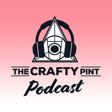
Brewing In The Deep South
"Balance is key for me in beer. I really love when a brewer can execute the balance between malt, hops and yeast."
Dave Macgill is a brewer whose name will be well known to many in all parts of the Australian beer industry. For many years, he was head brewer at Tasmania’s Moo Brew, just one of three people to hold the reins at the pioneering brewery across its 20-year history.
These days, you’ll find him at Deep South Brewing Co, the North Hobart brewery he launched in 2021 with some old mates. While visiting Hobart earlier in the year, Will and Craig caught up with Dave to chat about the Deep South story, his time at Moo, and his continued passion and optimism for the beer industry.
Before the interview, James and Will talk about The Crafty Pint’s recent Beer By Design features focusing on trends and the artists who bring beer cans to life, our Brew & A with Becky Centeno, and the Pint of Origin 2025 festival program launch.
As ever, don’t forget to submit your entries for our Have You Done A Rallings? celebration of the country’s good beer citizens, as well as your nominations for Bluestone Yeast’s Brewery of the Month.
Start of segments:
- 8:05 – Dave Macgill Part 1
- 26:48 – Dave Macgill Part 2
Relevant links:
- Beer By Design: The Artists
- Beer By Design: The Trends
- Brew & A: Becky Centeno
- Pint of Origin 2025
- Dave Heads Deep South
- Deep South Brewing Co
- Nominate a good beer citizen
- Nominate a Bluestone Yeast Brewery of the Month
To find out more about supporting the show or otherwise partnering with The Crafty Pint, contact craig@craftypint.com.
